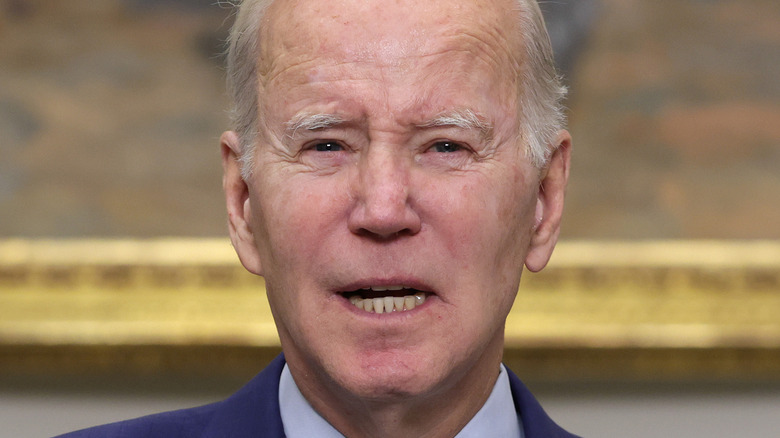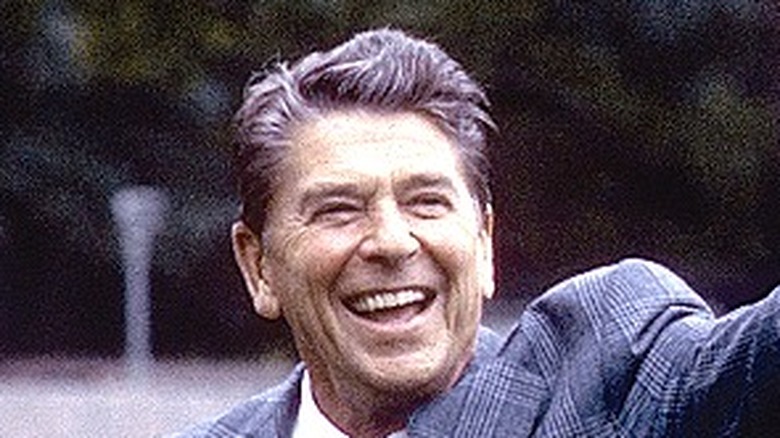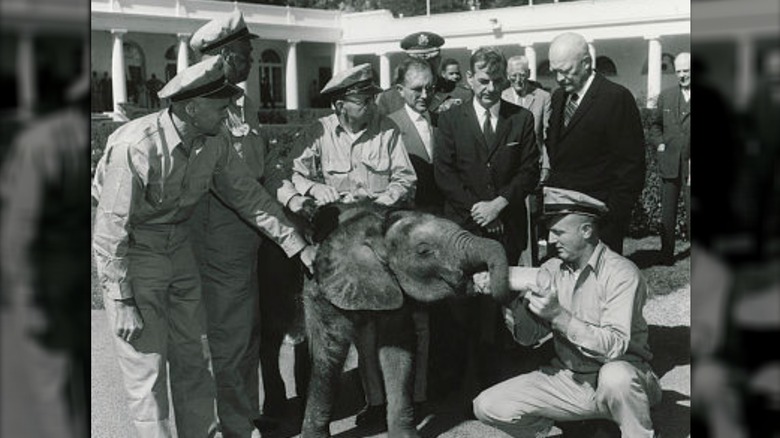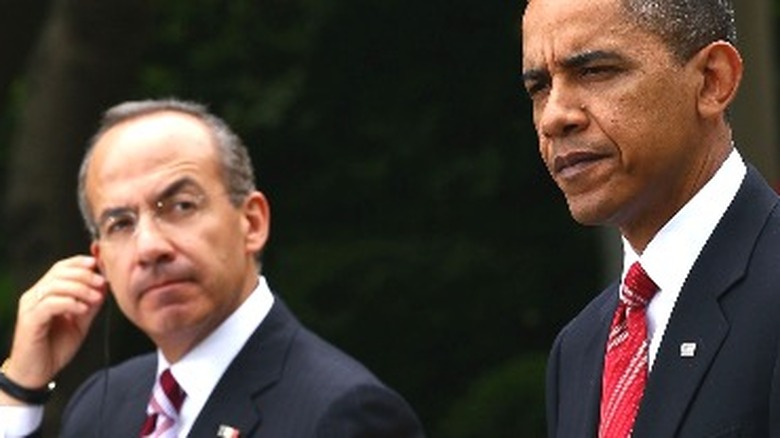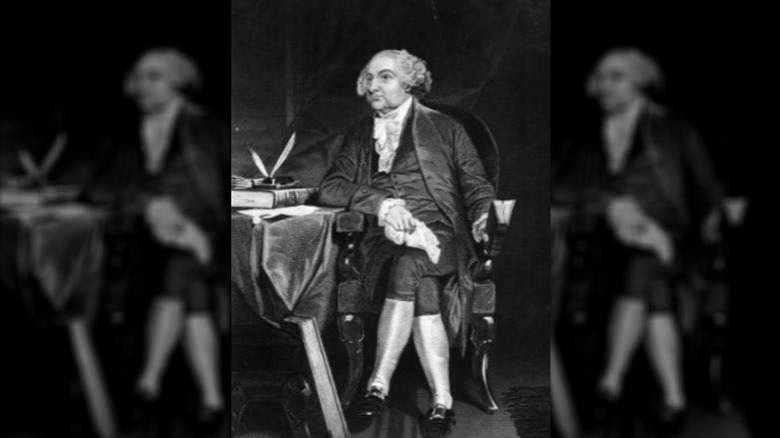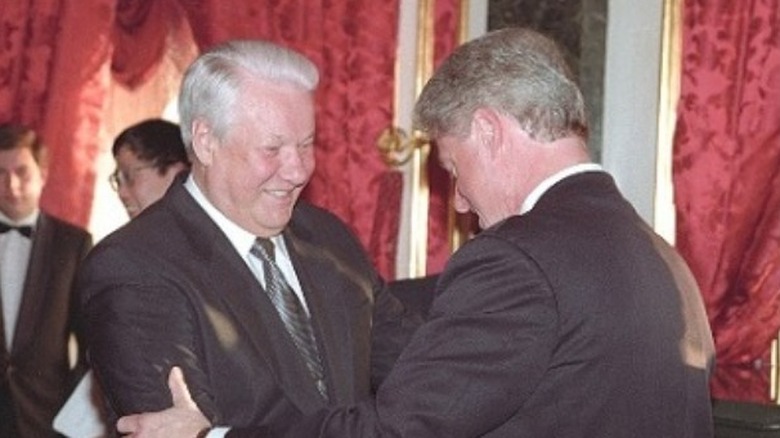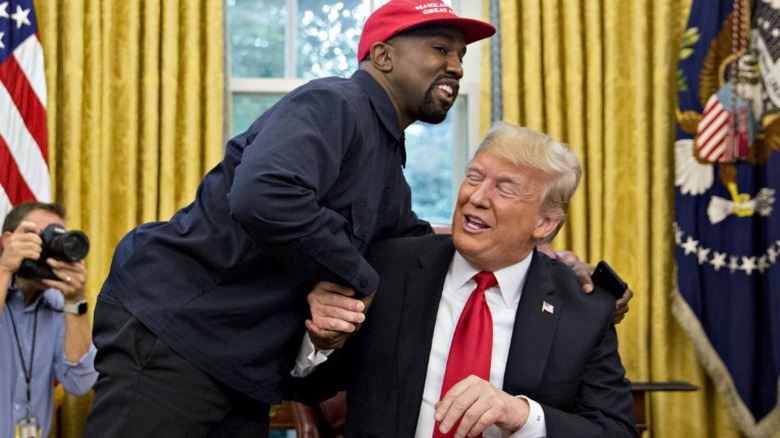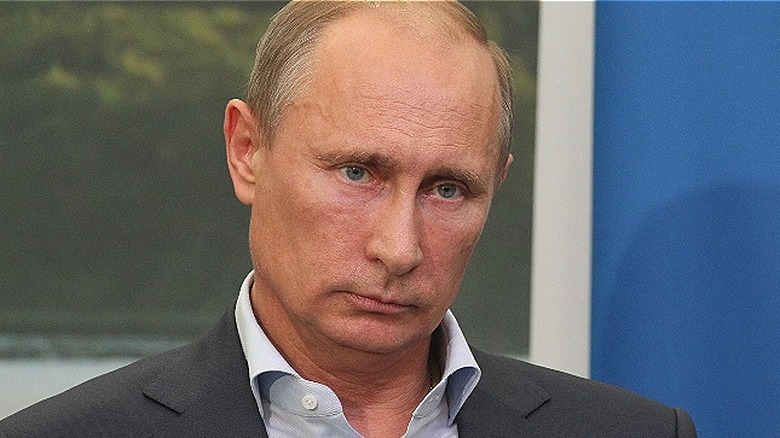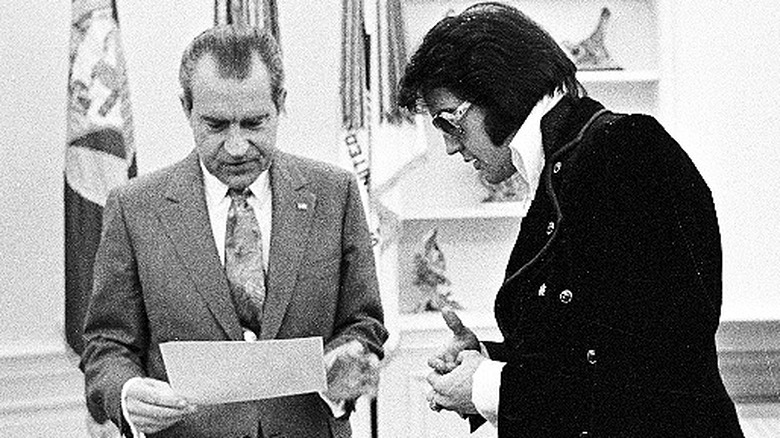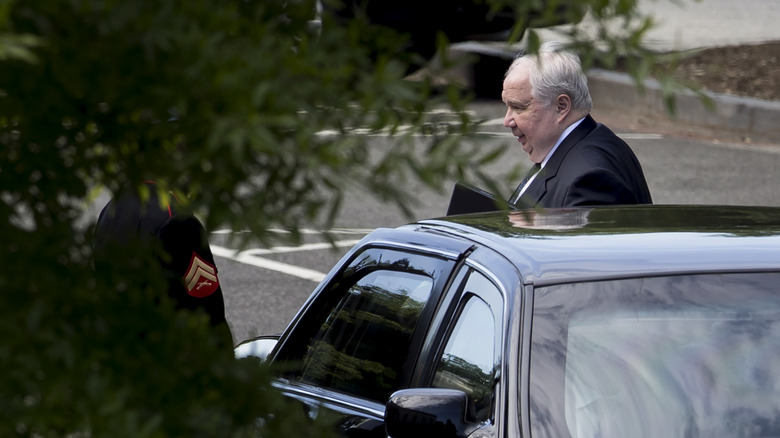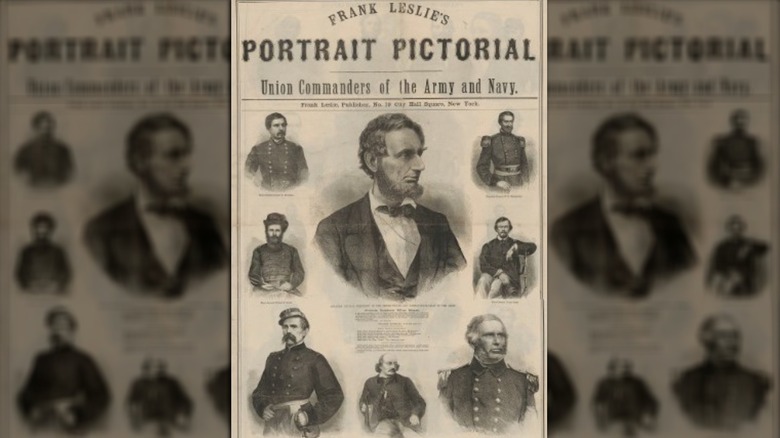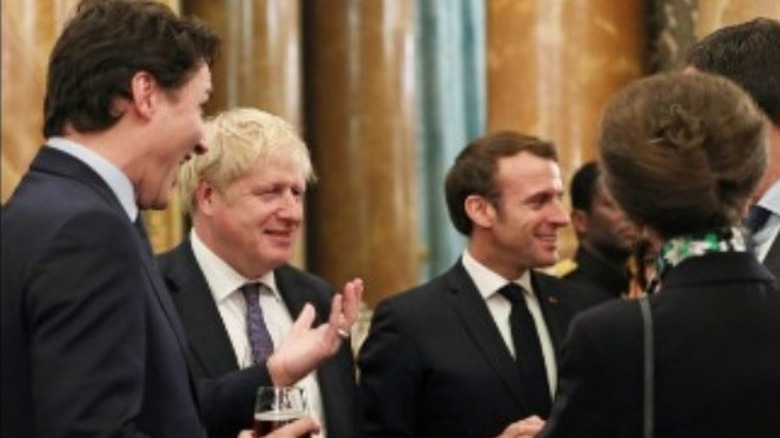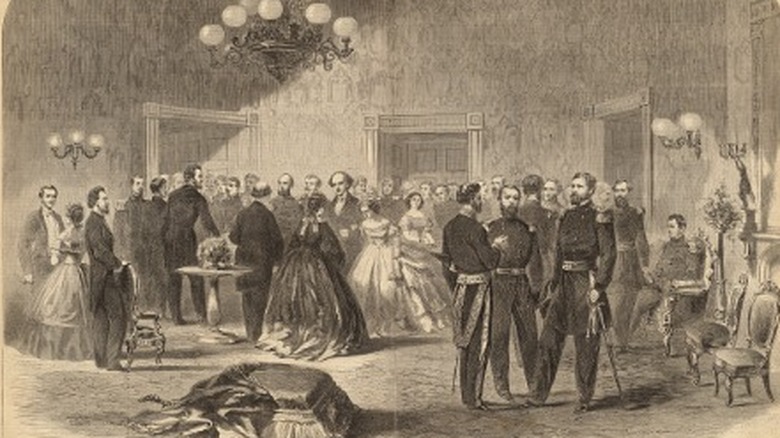Biggest Mistakes People Make When Meeting The President Of The U.S.
From the lettering on the invitations to the placement of the flags and the order of the anthems, formal visits with United States presidents are dominated by protocol. Meetings are recorded, translated, photographed, and archived for posterity. Meals and entertainment are scrutinized for cultural and religious correctness. Security is beyond tight, and time is counted in seconds. Little is left to chance, because with the power of the office of the presidency, even the smallest missteps can lead to disaster.
Avoiding such stumbles with foreign leaders and dignitaries is the mission of the White House's Office of the Chief of Protocol. Created in 1928, the protocol office comprises seven divisions that handle everything from the hospitality requirements of the president's guest house to the logistics of summits and high-level meetings. Every employee, from the chief of protocol to the purse-runner, is tasked with making presidential visits smooth and gaffe-free.
But even the best-laid plans of presidential protocol can be undone by the missteps of the president's guests. From George Washington on, people — famous and otherwise — have been making mistakes upon meeting the country's highest office holder. Sometimes these social breaches are inadvertent, sometimes they are deliberate. Always they make headlines.
Being a White House no-show
You've RSVP'd your invitation to meet the president. Press releases have been issued and preparations are underway for your arrival. Then at the last minute you announce you're not coming. While 11th-hour cancellations are a breach of etiquette in any social circle, at the White House they are cardinal sins that can carry the risk of diplomatic failure.
As reported in the Los Angeles Times, in July 1986, a few days before he was to arrive in Washington, Morocco's King Hassan II, chairman of the Arab League, declared he would not attend a previously announced meeting with President Ronald Reagan. The purpose of the visit was to discuss the fraught situation in the Middle East and his country's controversial treaty with Libya.
Hassan's claim that the cancellation was ordered by his doctors was met with skepticism in Washington. He admitted later that the real reason for the postponement was his last-second decision to bypass Reagan and to conduct direct talks with Israel's Prime Minister Shimon Peres instead. According to The Washington Post, although Peres had urged Hassan to meet with Reagan, Hassan demurred, insisting he didn't want to appear to be "under the umbrella of one superpower or another."
Held a few days later, the two-man summit was deemed a failure, and improved relations between Israel and the Arab world remained a distant dream. Whether a Reagan meeting would have increased Hassan's diplomatic chances is unknown, but the abrupt cancellation did not help.
Bringing the wrong gift to the presidential meet-and-greet
Since the first visit by a foreign leader in 1874 — King Kalakaua of Hawaii — the White House has seen its share of extravagant and odd presidential gifts. As chronicled by NPR, U.S. presidents have received everything from coats to daggers to wild animals. Queen Victoria once gifted President Rutherford B. Hayes with a desk made from the British ship HMS Resolute, which remains in use in the Oval Office to this day. In 1959, President Dwight Eisenhower received the far less practical gift of an elephant from the French Community of African Republics.
To avoid the appearance of improper influence, the Foreign Gifts and Decorations Act dictate that presidential gifts from foreign leaders valued over a certain, modest sum must be relinquished to the National Archives shortly after they have been received, notes The Atlantic.
According to the AP, this requirement proved problematic when, in 2005, Bulgaria's President Georgi Parvanov gave George W. Bush a Bulgarian sheepdog puppy. The dog was wreaking havoc at the National Security Council when the director of the presidential materials staff at the National Archives received a call to retrieve the gift, as per regulations. The director balked.
Because the dog couldn't be archived, the Bushes were allowed to purchase it for $430. The puppy was eventually rehomed with a family in Maryland. Since that present fail, no animals, wild or domestic, have been gifted to the U.S. president.
Bringing the wrong interpreter to the White House
Occasionally diplomatic interactions with U.S. presidents have been marred by poor translations. Since so much of spoken diplomacy rests on precise word choice and syntactical subtily, sloppy translations can easily lead to confusion. Diplomatic interpreters must not only be fluent in a particular foreign language, they must also be knowledgeable about the topic being discussed, be focused and impartial, and be adept at reading their speaker's body language and vocal inflections.
According to Salon, during a 2010 visit to the Obama White House, the opening remarks of Mexico's president Felipe Calderón were nearly lost in a bad translation. As Calderón spoke about U.S.-Mexico relations, the inexperienced interpreter mangled the speech to the point of incomprehension. His work was so inept that the White House declined to post his translation in its official read-out, instead offering the Spanish Embassy's more accurate transcript. While the inartful translation didn't cause an international incident, it caught many in the White House off-guard and proved an embarrassment to the Mexican administration.
Even highly skilled interpreters, such as Igor Korchilov can make humiliating, potentially costly misstatements. As reported by Newsweek, in 1990, during an arms control meeting between Soviet leader Mikhail Gorbachev and President George H. W. Bush, Korchilov mistakenly translated "verified" as "verifying," effectively switching the treaty positions of the two adversaries. Fortunately, Gorbachev, who also spoke English, quickly corrected Korchilov's error, avoiding a diplomatic meltdown.
Declining your White House successor's inauguration invite
Not all presidential mistakes are made by foreigners and ordinary citizens. Even former presidents can violate White House norms and decorum. Former president Donald Trump's pointed absence from all of Joe Biden's inaugural events in 2021 was an expected snub and the first in recent history, but it was not the first. Three other ex-presidents chose the no-show routine before him.
According to the White House history website, the Adamses, father John and son John Quincy, both failed to attend inaugurations for their successors. In 1801, John Adams slipped out of the White House just before successor Thomas Jefferson's inauguration. Adams never explained his early morning departure, but some speculated that he left in order to avoid a confrontation with factions of Jefferson's opposing party.
Following in his father's footsteps, John Quincy Adams exited the White House prior to his successor Andrew Jackson's 1829 inauguration. Although the two were both in Washington for weeks prior to the inauguration, neither made any effort to meet the other.
The final breach of decorum occurred in 1869 when Andrew Johnson declined to attend the inauguration of Ulysses S. Grant. Animosity between the two was well-documented, with each publicly calling the other a liar. According to The Washington Post, Grant refused to ride in the same carriage with Johnson, and Johnson retaliated by refusing his invitation to the inauguration.
Drinking too much while discussing important matters with the president
The tradition of serving wine at White House dinners is as old as the presidency. George Washington would offer his guests heavy port and Madeira wine. Thomas Jefferson, as noted by NPR, not only was a wine connoisseur but a vintner as well. Even such teetotaling presidents as George W. Bush understood the social importance of a good wine pairing.
Of course, with wine comes inebriation, and with inebriation comes embarrassment. Perhaps the most notorious abuser of White House alcohol was Soviet president Boris Yeltsin. According to Politico, during his first visit with President Bill Clinton in 1994, a drunk Yeltsin stumbled out of Blair House, the presidential guest quarters, in the middle of the night, clad only in his underwear. Standing on Pennsylvania Avenue, he began yelling for pizza while trying to hail a cab. Secret Service agents stopped him, but the next night, he attempted to sneak out again. This time he was nabbed by a security guard, who mistook him for a drunken intruder.
Yeltsin also made dubious history during a 1995 meeting with Clinton in New York. There to discuss the Bosnian war, Yeltsin appeared with Clinton at a press conference after an afternoon of over-imbibing white wine. Visibly intoxicated, Yeltsin undiplomatically declared the U.S. press "a disaster." Clinton responded with gales of laughter, interpreted by some as an attempt to cover up Yeltsin's drunkenness.
Forgetting your manners in front of the president
It might seem obvious that good manners and proper etiquette would be a prerequisite for a successful meeting with the U.S. president. Sometimes in the excitement of the White House moment, however, visitors forget their Ps and Qs.
As noted by Time, during a White House dinner in 2008, Italian Prime Minister Silvio Berlusconi overdid his praise for President George W. Bush when, on his way to give him a hug, he knocked over the lectern, breaking it in two. While still holding its remains, Bersculoni continued talking into the lectern microphones, telling Bush, "This is what too much love can do."
During his much-publicized 2018 Oval Office meeting with President Donald Trump, rapper Kanye West broke protocol and the Internet when, according to The Washington Post, he let loose with an f-bomb, kept his baseball hat on, made a reference to male genitalia, and gave his host an awkward, rib-crushing embrace.
White House dinners can be etiquette landmines for the uninitiated. At one state dinner, a guest of President Franklin Roosevelt unwittingly drank out of the finger bowl, prompting Eleanor Roosevelt to drink out of hers in a show of social grace. According to Vanity Fair, at a White House dinner celebrating Queen Elizabeth, former television talk show host Elisabeth Hasselbeck mistook her rose-petal-infused finger bowl for dessert but was saved from disgrace by Secretary of State Condoleezza Rice.
Giving the president attitude while the cameras roll
Whether you're a kid dragged along to the White House by your parents or the leader of Russia, looking bored during your meeting with the president is a decorum no-no.
Over Barack Obama's two terms, White House photographer Pete Souza captured numerous images of young children looking disinterested or distracted while meeting the president. In the most infamous one, a boy is caught doing a face-plant into the Oval Office couch while his oblivious parents carry on a conversation with Obama.
In 2014, a press video taken during a public service drive at a Washington, D.C. charter school records an even bigger display of youthful tactlessness. In it, as reported by Vanity Fair, a student stuffing backpacks alongside Obama confesses her disappointment that the "special" somebody she was told to expect turned out to be just him, the president, and not Beyoncé.
While Obama took these gasp-worthy slights from kids with humor, he was less tolerant of the mugging of Russian President Vladimir Putin. Over the years, Putin had earned a reputation as the bad boy of conferences and summits, often displaying for the cameras an array of dismissive facial expressions and body language. Photos taken at the 2013 G8 summit show him slouching and grimacing next to Obama. In what Vox called "side-eye diplomacy," Obama shot back with his own scowls and later described Putin as "looking like that bored schoolboy in the back of the classroom."
Greeting the president with a gun
Bringing a weapon to a presidential meeting seems an obvious no-no. And celebrity and citizen alike are equal in terms of protocol. Someone should have told that to Elvis Presley. In December 1970, the legendary singer stopped by the White House for a visit with President Richard M. Nixon. According to the Smithsonian, in a spur-of-the-moment decision, Presley, an avid collector of guns and police badges, decided to fly to Washington, D.C. to secure a badge from the federal Bureau of Narcotics and Dangerous Drugs.
Presley also happened to be Nixon fan and figured the president could get him the coveted badge. To seal the deal, he wrote the president a note offering his help in the war against drugs in exchange for a federal agent's badge.
As documented in White House memos, Presley arranged a meeting with the president through an intermediary. In striking contrast to the staid, gray-suited Nixon, Presley arrived at the White House dressed in a purple velvet suit and sporting a giant gold belt buckle and amber sunglasses. He was also carrying a World War II Colt .45, taken from his personal collection.
All seemed to be going as hoped until Secret Service agents stopped Presley outside the Oval Office and confiscated the Colt. Apparently not even the all-American Presley was to be trusted coming face-to-face with the president while holding a gun. In the end, though, Presley received his federal agent's badge, and Nixon got the Colt.
Posting pics of your Oval House meeting online
Getting your picture taken with the president is a meeting must, unless photo ops aren't allowed and possibly considered a security breach.
In May 2017, President Donald Trump held an Oval Office meeting with Russian Foreign Minister Sergei Lavros and Russian Ambassador Sergei Kislyak to discuss the conflicts in Syria and Ukraine, reports The Washington Post. Rumors had been circulating that Kislyak was a Russian intelligence operative masquerading as a diplomat. Certainly his pre-election conversations with former national security advisor Michael Flynn had cost Flynn his job and were seen as highly irregular if not illegal.
Kislyak and Lavros arrived at the Oval Office with a photographer, who was allowed to take pictures even though the U.S. press corps had been banned from the meeting. Intelligence officials expressed concern, arguing that photography equipment could easily hide listening devices, which the photographer could have planted while moving about the office.
Shortly after, the photographer's pictures of the smiling trio appeared online, along with a story about the meeting, all published by by the Russian state-run news agency Tass. The American media had been scooped, and accusations of improper access flew. A few days later, according to Reuters, word leaked that Trump had revealed top-secret intelligence to the Russians, adding to the growing suspicion that Vladimir Putin truly had Trump's number.
Practicing gross insubordination toward your commander-in-chief
For military personnel, disregarding presidential protocol is a decorum double threat, as the president is both a revered host as well as a boss. According to History, in his dealings with President Abraham Lincoln, Gen. George McClellan earned a reputation as a serial protocol abuser. Despite the authority Lincoln had invested in him, McClellan showed disdain for his commander-in-chief, calling him a coward, and was often late for or absent from important meetings.
In letters to his wife, as reproduced in lincolnandchurchill.org, McClellan also insulted Lincoln. In August 1861, after a White House dinner, McClellan wrote to his wife and described Lincoln as a "well meaning baboon." He also called Secretary of State William H. Steward, who criticized McClellan for his frequent violations of protocol, "a meddling, officious, incompetent little puppy." In a November 1861 letter, he wrote, "I went to the White House shortly after tea where I found 'the original gorilla' about as intelligent as ever," notes Edward H. Bonekemper in his book, "McClellan and Failure."
Soon after he had named McClellan general in chief of the Union Army, Lincoln, Seward, and secretary John Hay stopped by McClellan's home for a late-night meeting. Informed that the general was out, the men decided to wait for his return, but when McClellan came back, he ignored his guests and retired to his bedroom. Although Lincoln refused to be offended, stating it was "better at this time not to be making points of etiquette and personal dignity," he fired McClellan a few months later.
Talking smack about the president behind his back
Gossiping about the president is not just a violation of decorum, it can lead to a PR nightmare if it happens to be recorded on a hot mic. During the 2019 NATO meeting at Buckingham Palace, as reported by CNN, Canada's Prime Minister Justin Trudeau, France's President Emmanuel Macron, and Great Britain's Prime Minister Boris Johnson were caught on tape poking fun at President Donald Trump. The world leaders were unaware their cocktail conversation was being picked up by a microphone.
In the recording, Trudeau can be heard joking about Macron being delayed by a 40-minute press conference, an apparent reference to Macron's and Trump's just-completed joint media appearance, which was dominated by the U.S. president's rambling commentary. According to CNBC, Trump's opening address at the meeting also far exceeded its scheduled 20 minute time slot.
The tape quickly went viral, and when asked about the leaders' hurtful remarks during a joint interview with Germany's leader Angela Merkel, Trump called Trudeau "two-faced." A few days later, Saturday Night Live parodied the incident in its cold opening skit. The accidental recording proved comedy gold, but it also damaged Trump's already tenuous relations with the allied leaders.
Overstaying your White House welcome
No matter how important your visit or welcoming your White House host may be, respecting the president's time is still an etiquette must.
Abraham Lincoln was famous for his open-door visiting policy, which allowed ordinary citizens to show up at the White House to ask for a meeting. For hours, visitors would line up outside the residence, fill the rooms, and crowd the hallways, waiting their turn for an audience with Lincoln. As noted by the White House Historical Society, Lincoln believed that while these visits were time-consuming, there was no better use of his day than having "direct contact and atmosphere of the average of our whole people." Some visitors asked for pardons, others requested restitution for war losses. Others delivered speeches, and some offered the president their policy ideas. According to The Washington Post, Frederick Douglass discussed the plight of Black soldiers during one such impromptu meeting with Lincoln.
For the most part, Lincoln was a genial host and an attentive listener. Even when he was unable or unwilling to grant visitors their wishes, he gave each a fair hearing. However, even the patient Lincoln had his limits. If the petitioner droned on, he would bluntly urge them to get to the point. And if the visitor made the mistake of lingering too long, he might snap and say something like, "Now, my man, go away!"
